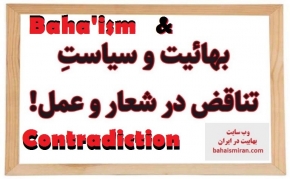This member of the Baha’ism organization was owning optical goods shop in 1394 (S.H.) which was sealed with the excuse of holiday in one of the feasts of the Baha’is creed. From that time on; he was busy working in ophthalmology. However, in the last days, the security forces forced the ophthalmologist to dismiss the Baha’i person. The Baha’i citizens are deprived of the freedoms related to the religious beliefs and are living under the descriptive circumstances.[1]
However; to answer to making movement concerning the news about the dismissal of the Baha’ism member, it is necessary for several notes to be mentioned here:
1) At first, the reason for sealing the optical tools shop belonged to this Baha’i person is mentioned to be the cancelation during official religious days of Baha’ism. According to the teachings of the Baha’i leaders, nine days of the year have been announced to be cancelled and working is forbidden during these nine days[2]. This is a commandment which is against science and wisdom claimed by Baha’ism whose aim is accordance with science and wisdom[3].
For instance, suppose a city in which the Baha’is are living. During these days hospitals are cancelled. So, nobody is allowed to get sick! The fire stations are cancelled. Thus, no house is allowed to be burnt! The center for producing and distributing food are cancelled. So, nobody id allowed to get hungry! Military forces and the police are cancelled. So, no enemy is allowed to attack and no robber is allowed to rob!
2) How can the Baha’ism organization justify the civil disobedience of its member and pretend to be oppressed for his shop. While according to the teachings of the cult, the Baha’is are obliged to obey the governmental commandments. As the Baha’ism leader has considered acting the governmental orders as prior when there was disagreement between the Baha’i religious orders and the governmental rules: “The commandments stated by the Excellency Bahaullah in the book Aqdas are necessary to be fulfilled by all followers and the Baha’i organization across the east and west of the world on the condition that they are possible and aren’t directly against the civil rules of the country.[4]”

3) According to the Principle 14 of the Iranian Constitution: “The government of the Islamic Republic of Iran and all Muslims are duty bound to treat non-Muslims in conformity with ethical norms and the principles of Islamic justice and equity and to respect their human rights. This principle applies to all who retrain from engaging in conspiracy or activity against Islam and the Islamic republic of Iran.[5]”
However; as confessed in some parts of the message, this member of the Baha’ism organization has been convicted in court due to proselytizing against the Islamic Republic of Iran. Nevertheless; according to the emphatic order by the Baha’i leaders, the Baha’is aren’t allowed to speak against the governments and should only pray for them.[6]
4) Contrary to the oppressive view made by the Baha’ism organization aiming spreading hatred against the Islamic Republic of Iran which considers the Baha’is to be restricted and banned from work only because of their beliefs field observations indicate the high standard of living of many Baha’is in Iran.
[1] Narrated by the news networks of the Baha’ism organization.
[2] Refer to Hussein Ali Nouri, Question and Answer epistle, the electronic copy, p. 1.
[3] Ahmad Yazdani, the Spiritual rudiments, Bija, Tehran: the national assembly of publishing the national works, 104 Badi’a, p. 30.
[4] Hussein Ali Nouri, The Aqdas (The introduction of the book), the electronic copy, p. 14.
[5] Jahangir Mansour, The Constitution, Tehran: Dowran publications, 1393 S.H., p. 35.
[6] Refer to Dr. Esslement, Bahaullah and the new era, Heyfa publications: 1932 A.D., p. 264; Abbas Effendi, Makatib, Bija: The national institute of the faith press, 134 Badi’a, Vol. 8, pp. 246-247.
 English (UK)
English (UK)
 فارسی
فارسی 



